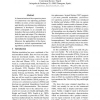Free Online Productivity Tools
i2Speak
i2Symbol
i2OCR
iTex2Img
iWeb2Print
iWeb2Shot
i2Type
iPdf2Split
iPdf2Merge
i2Bopomofo
i2Arabic
i2Style
i2Image
i2PDF
iLatex2Rtf
Sci2ools
124
click to vote
ACL
2010
2010
A Tree Transducer Model for Synchronous Tree-Adjoining Grammars
A characterization of the expressive power of synchronous tree-adjoining grammars (STAGs) in terms of tree transducers (or equivalently, synchronous tree substitution grammars) is developed. Essentially, a STAG corresponds to an extended tree transducer that uses explicit substitution in both the input and output. This characterization allows the easy integration of STAG into toolkits for extended tree transducers. Moreover, the applicability of the characterization to several representational and algorithmic problems is demonstrated.
Related Content
| Added | 10 Feb 2011 |
| Updated | 10 Feb 2011 |
| Type | Journal |
| Year | 2010 |
| Where | ACL |
| Authors | Andreas Maletti |
Comments (0)

